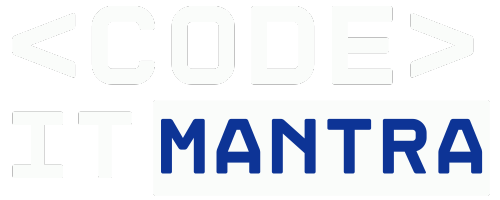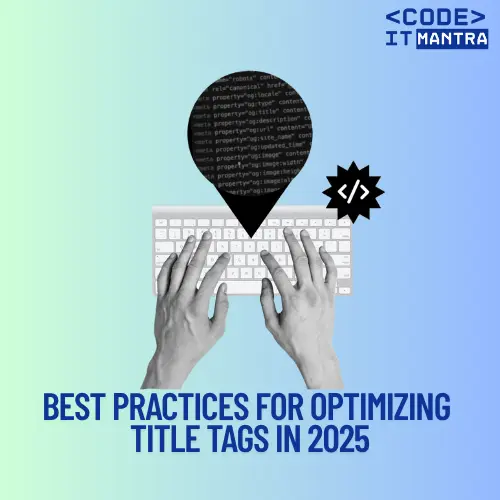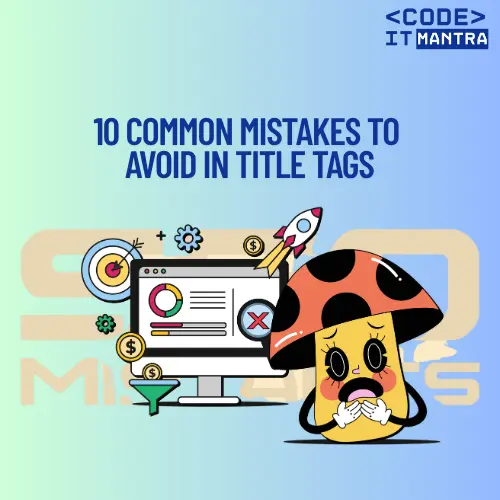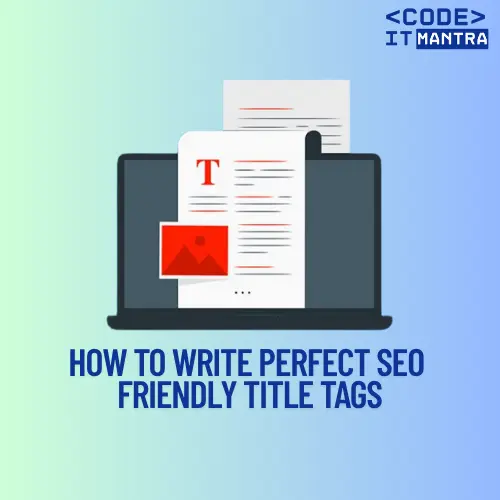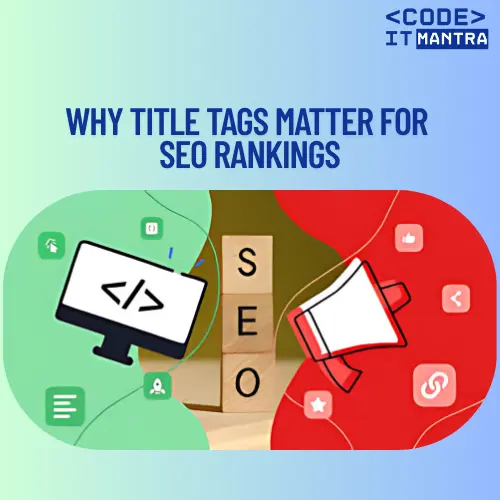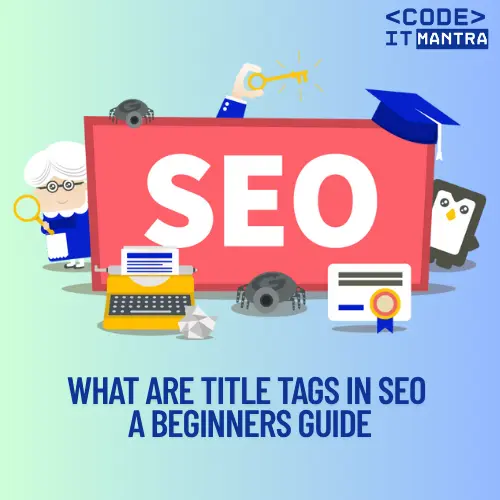Best Practices for Optimizing Title Tags in 2025
Table of Contents

What is / what has New in Title Tag Optimization in 2025
Title tags remain one of the most important elements in SEO for 2025. But recent changes in search engine algorithms & user behavior have introduced new best practices for optimizing title tags. Understanding what is / what has new in title tag optimization can help website owners improve their search rankings & attract more visitors in the evolving digital landscape.
1. Greater Focus on User Intent
In 2025 search engines like Google place more emphasis on user intent when evaluating title tags. This means your title should match what users are really looking for not just include keywords. For example instead of a title like "Cheap Phones" a better title might be "Affordable Smartphones with Best Camera in 2025." This clearly addresses what users want.
2. Lively & Personalised Title Tags
Modern websites can now use lively title tags that change based on user behavior or location. This personalization helps improve relevance & click-through rates. For example an e-commerce site might display "Best Running Shoes in New York" to users from that city. Using server-side code or JavaScript title tags can be customized actively to boost SEO.
<title>Best Running Shoes in New York | SportGear</title>
3. Longer Title Tags with Richer Descriptions
While the traditional advice was to keep title tags under 60 characters new search layouts now allow for slightly longer titles to give more detail. This helps pages stand out with richer descriptions that better explain the content. But the key is to keep titles clear & avoid unnecessary filler words.
4. Using Emotional & Practical Words
Title tags that include emotional or practical words tend to perform better in 2025. Words like "Discover" "Ultimate" or "Guide" attract attention & encourage clicks. For example "Discover the Ultimate Guide to Healthy Eating" is more inviting than just "Healthy Eating Tips." Adding such words helps engage users more well.
5. Integration of Voice Search Optimization
With the rise of voice assistants title tags are now optimized for voice search queries. This means using natural language & question phrases in titles such as "How to Improve Your SEO in 2025" instead of just "SEO Tips 2025." This approach matches how people speak & improves chances of appearing in voice search results.
6. Avoiding Keyword Stuffing & Spammy Titles
Search engines continue to penalize keyword stuffing so this is important to keep titles natural & user-friendly. Overloading titles with repeated keywords or irrelevant phrases harms rankings. Instead focus on writing clear meaningful titles that reflect the actual page content. Quality always beats quantity in title tag optimization.
7. Using Structured Data to Increase Titles
Structured data markup helps search engines understand page content better which can improve how titles are displayed. Adding schema.org tags related to products articles or events can lead to rich snippets with enhanced title presentations. This boosts visibility & increases click rates by making your listings stand out in search results.
8. Example of a Modern Optimized Title Tag
Here is an example of a modern optimized title tag for a blog post about healthy habits in 2025:
<title>Discover 10 Easy Healthy Habits to Boost Your Life in 2025 | WellnessBlog</title>
This title uses emotional & practical words includes the year for freshness & has relevant keywords placed naturally. This is clear inviting & optimized for both traditional & voice search.
Conclusion
Title tag optimization in 2025 focuses on user intent personalization natural language & rich descriptions. By avoiding keyword stuffing & using modern SEO techniques like structured data & voice search optimization websites can improve their search rankings & user engagement. Staying updated with these trends ensures your title tags remain effective in the changing SEO landscape.

Aligning Title Tags with Searcher Intent
Title tags play a crucial role in SEO because they are one of the first things users see on search engine results pages. Aligning your title tags with searcher intent means creating titles that match what people are actually looking for when they type keywords. This improves click rates & helps your website rank better.
What is Searcher Intent?
Searcher intent refers to the reason behind a user search query. It shows what the user wants to achieve or find. There are mainly three types of intent: informational navigational & transactional. Understanding these helps you create title tags that meet the user needs exactly & attract the right visitors.
Types of Searcher Intent
-
Informational Intent: Users want to learn or get information. For example "how to bake a cake." Titles should clearly show that the page provides helpful answers or guides.
-
Navigational Intent: Users want to find a specific website or page. For example "Facebook login." Titles should clearly include the brand or site name to match this intent.
-
Transactional Intent: Users want to buy or take an action. For example "buy running shoes online." Titles should stress offers products or calls to action to encourage clicks.
Why Aligning Title Tags with Intent is Important
Aligning your title tags with searcher intent helps in attracting the right audience. When users see a title that exactly matches what they want they are more likely to click. This improves your click-through rate (CTR) & signals to search engines that your content is relevant boosting your rankings.
How to Create Title Tags Matching Intent
-
Research Keywords: Use keyword tools to find common search queries & understand the intent behind them. For example keywords with "how to" usually show informational intent.
-
Use Clear & Relevant Titles: Your title should clearly describe what the page offers. Avoid vague or overly promotional language when intent is informational.
-
Include Target Keywords Naturally: Place your main keyword near the beginning of the title but keep it readable & natural to match what users type.
Example of Aligning Title Tags
Suppose you run a website about fitness. For an informational page the title could be: How to Lose Weight Fast: Proven Tips for Beginners. This clearly matches a user looking for weight loss advice.
For a transactional page a better title might be: Buy Best Protein Powders Online - Free Shipping Available. This attracts users ready to buy protein powders.
Solutions for Improving Title Tags
-
Use tools like Google Search Console or SEMrush to analyze which keywords bring visitors & what their intent might be.
-
Regularly update title tags based on performance data & changing user trends to keep matching the current searcher intent.
-
Test different title tag versions using A/B testing to find which ones perform best for your audience.
Conclusion
Aligning title tags with searcher intent is essential for successful SEO. By understanding user goals & crafting clear relevant titles you can increase your site traffic & improve search engine rankings. Focus on creating titles that serve users first & the SEO benefits will follow naturally.

Optimizing for Voice & Mobile Search
With the rise of smartphones & smart speakers voice & mobile search have become quite popular ways for people to find information online. Optimizing your website for these types of searches helps you reach more users & improve your website ranking. Voice search & mobile search require special attention because they work differently from traditional desktop searches. This guide explains how to improve for voice & mobile search with examples & clear solutions.
Understanding Voice Search Behavior
People use voice search differently than typing. When using voice they tend to ask longer more natural questions often in a conversational tone. For example instead of typing "best pizza New York" they may say "What is the best pizza place in New York City?" This means your content needs to include natural language & answer common questions clearly. Optimizing for voice search means focusing on how people speak not just keywords.
Why Mobile Search Optimization is Important
Most internet users now access websites on mobile devices. Google also uses mobile-first indexing meaning it mainly looks at your mobile version to rank pages. If your site is slow or hard to guide on mobile you will lose visitors & rankings. Making your website mobile-friendly with fast loading speed easy navigation & readable text is essential for success in mobile search.
Use Long-Tail Keywords & Natural Language
Long-tail keywords are longer more specific phrases that match how people ask questions in voice search. Instead of using short keywords like "coffee shops" use phrases like "Where can I find the best coffee shops near me?" Include these natural language phrases into your content & FAQs to improve voice search ranking. For example write content that answers common questions your audience might ask aloud.
Improve Page Speed for Mobile Devices
Page speed is crucial for mobile search optimization because slow pages cause users to leave quickly. You can improve speed by compressing images using a content delivery network (CDN) & minimizing unnecessary code. Tools like Google PageSpeed Understands show how fast your page loads on mobile & give suggestions for improvement. Fast-loading sites keep users happy & improve SEO rankings.
Use Structured Data for Better Voice Search Results
Structured data uses special code to help search engines understand your content better. Adding structured data like FAQs recipes or product information makes it easier for voice assistants to read & present your content as answers. For example using FAQ schema allows your page to appear as a rich snippet in search results which voice assistants often read out loud to users.
Make Your Website Mobile-Friendly
Ensure your website uses a responsive design that adjusts to any screen size. Use larger fonts buttons that are easy to tap & simple menus. Avoid using pop-ups or elements that can be difficult to use on small screens. Google favors mobile-friendly sites & will rank them higher in mobile search results. Testing your site on different devices helps identify & fix issues.
Example of Using Structured Data for FAQs
<script type="application/ld+json">
{
"@context": "https://schema.org"
"@type": "FAQPage"
"mainEntity": [{
"@type": "Question"
"name": "What is voice search?"
"acceptedAnswer": {
"@type": "Answer"
"text": "Voice search allows users to search the internet by speaking instead of typing."
}
}]
}
</script>
This example shows how to add FAQ structured data to your webpage. It helps search engines understand questions & answers improving the chance of being featured in voice search results.
Summary of Key Points
- Voice search uses natural conversational language so include long-tail keywords & answer common questions clearly.
- Mobile search requires a fast easy-to-use website that adapts well to small screens with responsive design.
- Improve page speed on mobile by optimizing images reducing code & using a CDN for better user experience.
- Use structured data like FAQ schema to help search engines understand your content for voice search features.
- Test your website on different mobile devices & browsers to ensure it works well for all users.
Optimizing for voice & mobile search is essential in today digital world. By focusing on how people speak improving mobile usability & using structured data you can increase your website visibility & give a better experience for your visitors. Following these steps will help your site rank higher & attract more relevant traffic.

Using AI Tools for Smart Title Suggestions
In today digital world creating catchy & effective titles is quite important for getting more clicks & visitors. But coming up with the perfect title can be challenging. This is where AI tools come in handy. AI tools use smart technology to suggest titles that attract users & improve SEO. These tools save time & help you create titles that fit your content well.
Using AI tools for title suggestions is becoming popular because they analyze trends keywords & user behavior. This helps create titles that are not only creative but also optimized for search engines. If you want to improve your content strategy & get better results learning how to use AI tools well is a great idea.
1. How AI Tools Help Create Better Titles
AI tools study a large amount of data from search engines websites & user searches. By understanding this data they can suggest titles that have a high chance of attracting clicks. For example if your article is about "healthy eating" an AI tool might suggest titles like "10 Easy Tips for Healthy Eating" or "How to Eat Healthy Every Day." These titles are clear relevant & attractive to users.
Solution: Use AI title generators like ChatGPT Jasper or Copy.ai to get multiple title options quickly. These tools give you ideas based on your topic & keywords making your work easier & faster.
2. Choosing Titles That Match Your Content
Even with AI suggestions this is important to choose titles that really represent your content. A catchy title may attract clicks but if the content does not match users will leave quickly. This hurts your website ranking & reputation. AI tools often give options so pick the one that fits your article best & is honest about what you offer.
Solution: Review the AI-generated titles carefully. Edit or combine suggestions to make sure the title matches your content & answers your audience questions.
3. Including Keywords in AI-Suggested Titles
AI tools often include important keywords in their suggestions but sometimes you may need to add or adjust keywords to improve SEO. Keywords help search engines understand what your content is about. For example if your focus keyword is "budget travel" make sure the title includes this phrase naturally. AI tools can also help identify related keywords to add more value.
Solution: Use keyword research tools alongside AI title generators. Combine the best keywords with AI suggestions to create optimized & attractive titles.
4. Avoiding Overuse of AI Titles
While AI tools are helpful relying too much on them can make your titles sound generic or robotic. Human creativity & understanding of your audience are still important. Use AI titles as a starting point but add your unique touch to make them more engaging & personal. This balance helps your titles stand out.
Solution: After getting AI suggestions customize them by adding emotional words or benefits. For example change "Tips for Saving Money" to "Easy Tips to Save Money & Stress Less." This makes your title more appealing.
Code Example: Using AI to Create a Title
<title>Smart AI Tools to Create Catchy Blog Titles Quickly</title>
This title uses keywords like "AI tools" "catchy blog titles" & "quickly." It clearly tells users what to expect & includes power words like "smart" & "catchy." AI tools can help create similar titles fast & easily.
Summary of Using AI Tools for Title Suggestions
- AI tools analyze data: They study user behavior & keywords to suggest titles that attract clicks.
- Choose relevant titles: Pick AI-generated titles that match your content to keep visitors engaged.
- Include keywords: Use keyword research along with AI suggestions to improve SEO naturally.
- Customize AI titles: Add your own creativity & emotion to make titles unique & appealing.
Using AI tools for smart title suggestions can save time & improve your content performance. When combined with your knowledge & creativity AI helps create titles that draw attention rank well in search engines & satisfy your audience. Start exploring AI tools today to make your content stand out.

SEO Trends: Future-Proofing Your Title Strategy
SEO is always changing & title tags remain one of the most important factors for ranking well in search engines. To stay ahead you must understand current SEO trends & prepare your title tag strategy for the future. This means creating titles that not only work today but also adapt to changes in how search engines read & display content. In this article we will explore key SEO trends & how to future-proof your title tags with examples & clear solutions.
1. Focus on User Intent Over Keywords
Search engines like Google now prioritize understanding user intent rather than just matching keywords. This means your title tags should clearly explain what the page offers to satisfy the user need. For example instead of a title like "Best Shoes 2023" use "Comfortable Running Shoes for Long Distance – Best Picks 2023." This tells the search engine & user exactly what the page is about improving relevance & click-through rates.
2. Increase Natural Language & Conversational Titles
With voice search & AI-driven results rising natural language titles are becoming important. Titles that sound conversational or answer questions tend to perform better. For example use a title like "How to Choose the Perfect Running Shoes for Beginners" rather than a keyword-stuffed phrase. This makes your title more relatable & more likely to match voice queries or question-based searches.
3. Keep Titles Mobile-Friendly & Concise
Most searches now happen on mobile devices where screen space is limited. Titles that are too long get cut off reducing their impact. Keeping your titles concise & placing important keywords near the start ensures that mobile users see the most relevant information. For example instead of "Buy Affordable & Comfortable Running Shoes Online with Free Delivery" use "Affordable Comfortable Running Shoes – Free Delivery."
4. Use Structured Data & Rich Snippets to Increase Titles
Structured data helps search engines better understand your content & can increase how your titles appear in search results. Adding markup like Schema.org can lead to rich snippets that include star ratings prices or availability right next to your title. For example a product page with a title tag "Best Wireless Headphones 2025" can show star ratings & price attracting more clicks. Using tools like Google Structured Data Markup Helper can make this easier.
5. Regularly Analyze & Update Your Title Tags
SEO trends & user behavior change over time. Regularly reviewing your title tags using tools like Google Search Console or SEMrush helps identify which titles perform well & which need improvement. For example if you notice a drop in clicks for a certain page try rewriting the title to include new keywords or a clearer value proposition. Continuous improvement keeps your SEO strategy fresh & effective.
6. Avoid Over-Optimization & Keyword Stuffing
Future SEO favors natural user-friendly titles over those stuffed with keywords. Over-optimization can lead to penalties or reduced rankings. Instead of cramming multiple keywords like "Best Cheap Running Shoes Cheap Online Sale" focus on a clear & concise title such as "Affordable Running Shoes – Quality & Comfort." This approach maintains readability & satisfies both users & search engines.
7. Personalization & Localization in Titles
SEO is moving towards more personalised & localized results. Including location or specific user interests in title tags can boost relevance. For example a bakery website could use "Best Fresh Bread in Chicago – Bakery Near You." This helps attract local customers & increases the chance of clicks from people searching nearby or with local intent.
Example of a Future-Proof Title Tag in HTML
<title>Affordable Running Shoes for Beginners – Free Shipping | YourBrand</title>
This title is concise includes user intent relevant keywords & branding at the end making it clear & effective for current & future SEO trends.
Summary of Future-Proof SEO Title Tag Tips
- Focus on user intent: Write titles that explain the page purpose clearly & match searcher needs.
- Use natural language: Make titles conversational & question-friendly for voice & AI search.
- Keep titles concise: Ensure mobile users see the most important information first.
- Use structured data: Increase your titles with rich snippets for more visibility.
- Update titles regularly: Analyze performance & refine titles based on trends & data.
- Avoid keyword stuffing: Keep titles readable & natural to prevent penalties.
- Include personalization: Use location or user-specific terms for better targeting.
By following these SEO trends & tips you can future-proof your title tag strategy. This will help your website maintain strong search engine rankings attract the right visitors & stay competitive even as SEO evolves. Keep your focus on users & clear communication through your titles to achieve lasting success.

Final Checklist: 2025 Title Tag Best Practices
Title tags remain one of the most important SEO elements in 2025. They help search engines understand your page content & attract users to click on your links in search results. To get the best results this is important to follow current best practices when creating title tags. This article provides a final checklist of the top title tag tips for 2025 with examples & solutions for easy understanding.
Why Title Tags Are Still Important in 2025
Title tags are the first thing users see in search engine results pages. They show what your page is about in a short clear way. A well-written title tag improves your page ranking potential & increases click-through rates. Even as SEO evolves the importance of strong relevant title tags does not change. Keeping them optimized is key to maintaining good search visibility.
1. Keep Title Length Between 50 & 60 Characters
Search engines typically display about 50 to 60 characters of a title tag. Titles longer than this are cut off which can confuse users or reduce impact. To avoid this keep your title concise but descriptive. For example:
<title>Affordable Yoga Classes for Beginners - Join Today</title>
This title is 55 characters long includes relevant keywords & is easy to understand. Using this length ensures your entire title is visible in search results.
2. Use Primary Keywords Near the Beginning
Search engines & users pay more attention to words placed at the start of a title tag. Placing your main keywords early increases the chance your page ranks well for those terms. For example instead of:
<title>Best Home Cleaning Services in Chicago | Sparkle Clean</title>
You can write:
<title>Home Cleaning Services Chicago - Sparkle Clean</title>
This way "Home Cleaning Services Chicago" comes first improving keyword relevance & user clarity.
3. Make Each Title Tag Unique
Duplicate title tags confuse search engines & can lower your site overall SEO. Every page should have its own unique title that describes its specific content. For example on an e-commerce site:
<title>Men Running Shoes - Brand A</title>for the men shoes page.<title>Women Hiking Boots - Brand A</title>for the women boots page.
Unique titles help search engines understand & rank pages correctly.
4. Avoid Keyword Stuffing
Keyword stuffing means adding too many keywords in a title to try to rank for many searches. This looks spammy & lowers click-through rates. Instead focus on one or two relevant keywords that naturally describe your content. For example a title like:
<title>Cheap SEO Services SEO Tips SEO Tools SEO Company</title>
is bad. Instead write:
<title>Affordable SEO Services for Small Businesses</title>
This is clear natural & user-friendly.
5. Include Your Brand Name When Appropriate
Adding your brand name in the title tag helps build brand awareness. This is best to place it at the end to keep the focus on keywords. For example:
<title>Delicious Vegan Recipes - Foodie Delight</title>
This shows the main topic first followed by the brand name. This approach balances SEO & branding well.
6. Use Clear & Natural Language
Titles should be easy to read & understand. Avoid jargon complicated words or overly technical language. Write as if you are speaking to a friend. For example:
<title>Simple Gardening Tips for Beginners</title>
This title is friendly & inviting. It clearly tells users what to expect on the page.
7. Test & Update Title Tags Regularly
SEO is always changing so regularly review your title tags to see if they are still effective. Use tools like Google Search Console to monitor click-through rates & impressions. If you notice a page has a low click rate consider rewriting the title to be more appealing or relevant.
Final Thoughts
Following this final checklist of title tag best practices in 2025 will help you improve your website search rankings & user engagement. Remember to keep titles concise use important keywords near the start avoid duplicates & stuffing add branding wisely & write naturally. Regularly checking & updating your titles ensures they stay optimized as search trends evolve.

